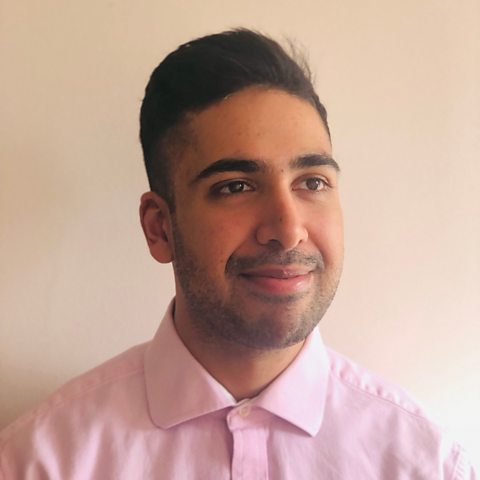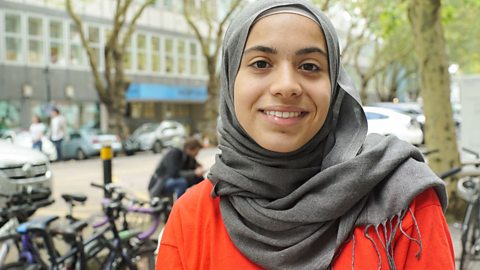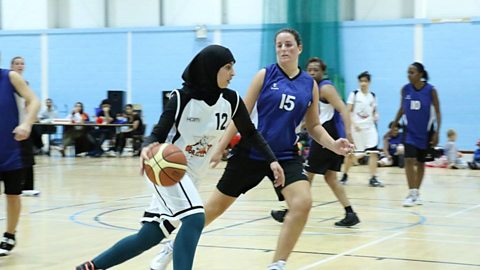It’s the month of Ramadan, when Muslims fast during the daytime. No food or drink from dawn to sunset. Everything stops, right? Well, traditionally, in Muslim countries, holidays are built around this month. But what do people do in the UK?
Fasting in the month of Ramadan is one of the five basic pillars in Islam. It is an opportunity for Muslims to develop self-discipline. It is also a way for them to show appreciation for what they have been given and be aware of those who are less fortunate.
Muslims up and down the UK will be fasting as they carry on their normal lives. So what happens in the workplace when people fast? Is productivity affected? How do you navigate lunchtime? We asked real people these questions and more, and were given some very honest answers.
Khalil, farmer, 25, Oxford

What’s it like fasting and being a farmer?
It’s particularly hard now because of the long days. It’s the lack of water, not food, which gets you.
My job is very physically demanding, with long periods of physical strain outdoors. Fencing, scything, catching chickens… all these things build up a sweat, which makes you lose water.
This can make you feel thirsty and give you a headache if you aren’t careful.
What do you do to cope?
The key is being smart about planning work. I do short bursts of physical activity, rather than prolonged periods of physical strain. We plan our work around Ramadan. I also eat smart, lots of slow release, high energy foods, like lentils and porridge.
Solidarity helps too! Because I work on a Muslim farm we all know where we are coming from and each of us is ready to muck in (sometimes literally) and help each other out, if one of us needs to take a break.


Zainab, 22, assistant auditor, London

So, uh, what is it you do?
I audit different government entities (departments) and scrutinise public spending for parliament.
What was it like the first time you fasted in the office?
My very first time fasting was when I was interning. People were intrigued, and genuinely wanted to know more about what I was doing and why. The first few days are always difficult; I just keep super-busy and distract myself with work.
What advice would you give to someone fasting for the first time at work?
Initiate a conversation with your employer. People might be surprised at how accommodating line managers are. I was lucky enough not to have to bring it up, my manager did.

What are the benefits of fasting on your working day?
When I fast, I become calm as a person, I let go of the trivial things, maybe because I don’t have the energy to worry about them. My productivity goes up too, especially as my manager lets me work flexibly. This makes me want to do my best and show my appreciation.
What has your workplace done to make things easier?
Flexible working hours! Unfortunately this year Ramadan falls on our busiest season, so we have to work a couple of hours extra each day. My manager suggested to me that I start later and finish later, so that when I go home, it’s time to eat.
Also an email went round informing line managers to allow staff to take Eid (the religious festival that marks the end of Ramadan) as annual leave. Normally staff are not encouraged to take leave during this period. I feel lucky to work in such a supportive environment.

Sarah, 25, pharmacist, London

What was your first Ramadan like at work?
Pretty tiring! It was my pre-reg year (the year before I qualified as a pharmacist). I was studying and working and I got married. It was pretty intense.
I had to adapt to working long hours, feeling weak, lacking sleep, and still find time to study, but I did it!
What could be done to make it easier for you?
I don’t like to use it as an excuse for anything. I made the decision to fast. I don’t want people to feel sorry or make any special arrangements. I’m choosing it because I feel it’s good for me and my life.
This time round, I have changed my working hours, but before I couldn’t. I just had to step up.
What helps?
I find having an organised timetable and managing my sleep, work and food balance helps.
Your attitude makes a big difference too. If you feel it is going to be a month of starvation, you might be making it harder for yourself than you need to. But if you go in thinking how much it’s going to benefit you, you will get those benefits.
What things should your colleagues be aware of?
People that are fasting might be a little sleep-deprived and a bit weaker. Maybe try and be considerate of this. But remember they have chosen to fast, don’t feel sorry for them. They’ll have up-and-down moments, a bit like in any diet.

Imran, 31, cyber security consultant, Tewkesbury

What do you do?
I am a cyber security consultant; I find vulnerabilities in computer systems, report back to our clients and offer advice on how to fix them.
What do I need to know about Ramadan?
It’s a period of spiritual growth, deeply important to Muslims and one of its core pillars. It comes with a plethora of benefits to the body, mind and soul.
How has your company reacted to you fasting?
Work has been very understanding. Testing doesn’t have to be in the 9am-5pm window, and they have been very flexible with my hours. I do sehari (eating just before the fast starts) and then go in, at about 4 or 5 am and work through until lunch. Then I head home to pray and rest until iftar (breaking of fast).
When possible they allow me to work from home, and the lack of commute really helps!
What helps?
Tapering off caffeine helps. I try and break the routine of having a coffee on my desk in the morning, a couple of weeks before Ramadan.
I would suggest starting early and slowly building into a fast to avoid the withdrawal headaches that can happen in the early days of fasting.
What advice would you have for non-fasting colleagues?
Act normal, no covert operations are needed for tea and coffee!

Khadija: first aider
Khadija uses her medical knowledge to teach young people first aid.

What is Ramadan? - C±«Óătv Newsround
Muslims around the world are observing Ramadan. Find out more about this Islamic month.

Ramadan: Your stories
What's it like to fast during your exams?
